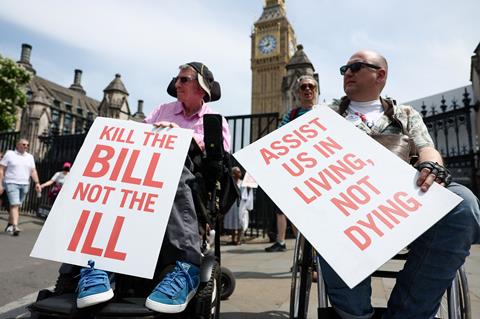This is a bad bill, one of the worst, says George Pitcher. To send it packing is precisely the level of scrutiny that the Lords should provide

Democracy is the sort of national treasure that can do no wrong. It’s almost a holy relic, to be venerated. It is lauded intuitively over wicked autocracies, theocracies (such as Iran) and dictatorships.
Except that’s not entirely true. Democracy can be inefficient, ineffective and just get things plain wrong. Democracy can be weaponised and become a kind of religious fundamentalism, as when the US and UK tried to bomb Iraq into it in 2003 and triggered a global cultural conflict – the War on Terror – from Afghanistan to America.
That democracy is the worst form of government, except for all the others, is an at once witty and profound epigram ascribed to Winston Churchill. Except, again, he didn’t say it. What he said to the House of Commons in 1947 was that it had indeed been said from time to time, “but there is the broad feeling in our country that the people should rule, and that public opinion… should shape, guide and control the actions of Ministers…”
Note that “shape, guide” as well as “control”. The will of the people shapes and guides our elected chamber. It doesn’t just control it. And, naturally, it shapes and guides the unelected and consequently undemocratic House of Lords, which it doesn’t control at all.
This has just become a most vitally important component of our unwritten constitution, a matter literally of life and death, as the assisted-dying bill has passed its third reading in the Commons by the narrowest margin and now returns to the Lords for scrutiny.
The higher chamber bears the weight of the heaviest moral responsibility that its members will have borne in their lifetimes in addressing this deeply flawed bill. It has been under-debated by parliament, its safeguards are feeble and are anyway weaker than were promised in the original private member’s bill; it weakens palliative care in already struggling hospices, it puts the vulnerable at greater risk and, as Gordon Brown argues, it offers “choice” at the end of lives when in reality it removes it.
Its supporters, led by MP Kim Leadbeater, have rushed it through with compromise and negligence so something, anything, is on the statute book to allow the terminally ill to have the state help them to kill themselves. They are driven by mixed motives, but one is that polls show popular support for assisted suicide. The people want it! So be it. The House of Lords now have to save the people from themselves.
And so the euthanasia campaign, from Leadbeater to the terminally ill TV presenter Esther Rantzen, earnestly reminds us that the Lords’ role is only one of technical scrutiny and not one that should frustrate the legislative will of the elected house. The assisted-suicide lobby fears that the Lords will filibuster, with a snow-storm of amendments, each of which must be debated, so the bill runs out of parliamentary time and, as a result, may not return for a decade.
But that is precisely what the House of Lords should do. Not because their opinions might vary, not through any religious conviction and, importantly, not to frustrate democracy. But because, quite simply, this is a bad bill, one of the worst. To send it packing is precisely the level of scrutiny that the Lords should provide.
We’ve already committed economic suicide with Brexit, now we have the real thing
There are precedents. The Brexit referendum of 2016 passed on the kind of wafer-thin majority that assisted-dying has just cleared in the Commons. Prime minister Theresa May struggled to construct a parliamentary bill to enact it that would be a net benefit for Britain. Unbothered by such niceties, her successor Boris Johnson just got “Brexit done”, an act of unparalleled self-harm. We stand, nearly a decade later, blinking in the economic wreckage, wondering what we’ve done.
We cannot allow this government – though precious few of its frontbenchers support it – simply to get assisted-dying done. We’ve already committed economic suicide with Brexit, now we have the real thing. It’s facile to speak of what people “want” in this context.
A referendum on capital punishment would doubtless return a majority result in favour and who knows what a future Reform UK government might do with that. The House of Lords could be the final bulwark of responsible and civilised thought.
This quality of civilised law – built on natural justice, protection of the weak and the primacy of every individual – doesn’t come from nowhere. Nor do principles of compassion, love and intimate care. These all derive from many centuries of the practical application of a Christian ethos. It’s partly why there are 26 bishops still sitting in the House of Lords.
They and their fellow peers have a duty now to reject this borderline wicked bill, by whatever means are available to them. They stand on both parliamentary and holy ground and by those too weak and demoralised to stand up for themselves. For once, democracy is too important to be left to the people alone.






































No comments yet